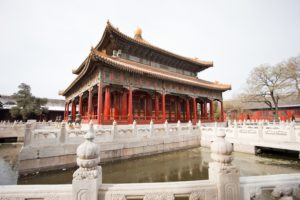
Confucianism is a movement that has existed for thousands of years. In the time since it first appeared, it has been labeled as a religion, a philosophy, and even a specific set of rules for governing a nation. While it has taken on many forms, the main ideas surrounding Confucianism have remained somewhat consistent. This is largely due to the fact that Confucianism revolves around five specific texts. Often referred to as the “Five Classics” by academics and members of the movement itself, these books have dictated much of what followers have believed over the years.
Up until recently, it was theorized that the philosopher Confucius, who the movement was named after, wrote all five of the texts. Now it is thought that these texts existed in one form or another before Confucius. The current theory suggests that Confucius and his followers shaped and reworked the texts to fit the ideas they were speaking about. While history is always something of a mystery, there is a lot to be understood by looking at the texts associated with the movement.
Changes and Songs
The most popular book associated with the Confucianism is the “I Ching.” Referred to also as the “Book of Changes,” this is a text that has seen widespread use both within the religion and amongst people who have no idea what Confucianism even is. Once, this was a text that was used as a sort of manual for those looking to get into divination. Now, it is used across the planet for a multitude of purposes. Individuals will use this book to gain perspective on ideas like business, philosophy, and even psychology.
Another popular book found amidst these classics is the “Book of Songs.” This text moves away from the mysteries of the world explored in the “I Ching” and enters a more poetic place. In fact, some of the earliest examples of Chinese poetry can be found within the “Book of Songs.” Followers of Confucianism read this text because it is believed that Confucius found deep meaning in human experience through music and poetry.
History and Society
Both the “Book of Changes” and “Book of Songs” are a bit more abstract and creative than the other texts that comprise the classics. The “Book of History,” in fact, is more of an exploration of how leaders should attempt to guide their people. The book contains texts and speeches from various important figures who ruled throughout different periods of history. The idea is to inform potential leaders of what does work and help them avoid the same mistakes others have made over the years.
The “Book of Rites” is similar to the “Book of History” because it explores how society should operate under the right leadership. The main idea is that society exists due to people needing to come together to form community based on trust. In this text, it is explained that all members of society serve important purposes no matter who they are or what they do.
Seasonal Shifts
The final text in this collection is “Spring and Autumn Annals.” This collection is the most specific, as it details the events surrounding the spring and autumn periods of Chinese history. While the text goes into an explanation of the events of 771 BCE to 446 BCE, it is not meant to be read purely for historical purposes. In the text, readers may discover deeper meaning about memory and personal identity in a collective.
Confucianism has lasted for quite a long period of time. Though it has been a religion, governing ideology, and more, it remains consistently steadfast in the ideals that support it. By exploring texts related to the movement, it can be easier to understand the philosophies surrounding this ancient mindset.

